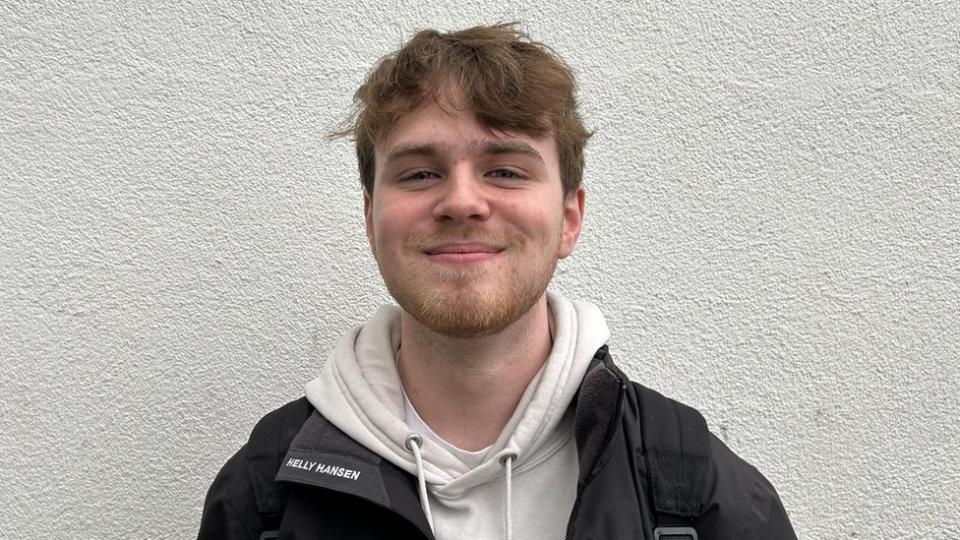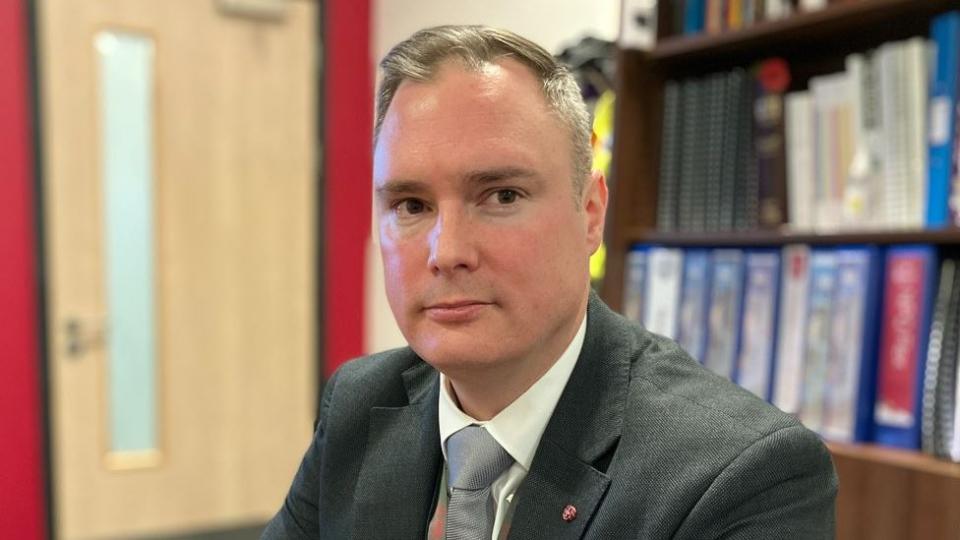‘It can’t come soon enough’
Stashing vapes behind a sink and hiding them in roof tiles – these are the extreme lengths two teenage boys went to keep their habit secret.
Their father, from London, said parents are “massively losing a war” against vapes.
He is backing a planned government ban on the sale of disposable vapes, as well as measures to stop vapes being marketed at children.
The BBC has spoken to young people, a teacher, a parent, a vape shop owner and an environmental campaigner about what the new measures mean.
‘I found a wall of vapes’
The father of three boys, who the BBC has chosen not to name, said the ban “can’t be strong enough or come soon enough”.
After finding a “wall of vapes” behind a sink, he was shocked to discover that his 13-year-old had been vaping for two years.
His eldest, a 16-year-old, recently hid a “mixture of disposable vapes, refillable vapes, cigarettes as well as ‘home-made cigarettes'” in the roof tiles of his house.
His youngest child, nine, is “obsessed” with the idea of vapes but has not tried them, the man said.
“We’re just waiting for the moment when he goes the other way and wants to try it, it’s like forbidden gold.”
The man said he and his wife have tried everything to stop their children vaping but “nothing seems to work”. This is despite it being illegal to sell vapes to under-18s.
His children have been drawn to vaping due to the wide range of flavours available and the often colourful packaging, he said.
“They genuinely love the flavours, it almost become a substitute for dessert,” he said. “They think: ‘Have a nice meal, then a salted caramel vape,'” he added.
Despite supporting the ban, he fears it will drive the sale of illegal or black-market vapes. Some vapes are not registered with the Medicines and Healthcare Products Regulatory Agency (MHRA), and may contain higher-than-permitted levels of nicotine or harmful chemicals.
‘I’ve been vaping since I was nine’
Emily, a 17-year-old college student from Stoke-on-Trent, said she first picked up a vape when she was nine years old. We are only using her first name.
She still buys disposable vapes now.
“I think it is getting worse,” she told BBC Newsbeat. “You can just go into a shop and get one because they don’t ID you that often.”
Despite saying she would miss vaping and “that addiction”, she thinks a ban would be a good thing – although she would consider cigarettes as an alternative if a ban came in, she said.
Fellow student Luke Saklatvala supports the ban on environmental grounds. So many disposable vapes “go to waste”, he said.

But he said the government needs a plan to support people who currently use vapes before introducing any ban.
“They’ve got to find a substitute for it,” he said.
Teacher: ‘My pupil collapsed’
Glyn Potts, head teacher of Newham RC College in Oldham, told BBC Radio 4’s Today programme he thought roughly 10% of his approximately 1,500 pupils had tried vaping.
He recalled a horrifying incident when a pupil who had stolen a vape off their brother’s bedside table collapsed shortly after arriving at school.
Mr Potts said: “They travelled on the school bus and as it pulled into the grounds, urged by his friends, he took a very large gulp from this vape pen.
“As he got off the bus he started to fell unwell and he collapsed.”

The boy required hospital treatment and it was later found that the vape contained spice, a laboratory-made drug known for its widespread use in prisons.
Mr Potts acknowledged the risk of a ban driving young people to buy disposable vapes on the black market, but added: “You can walk into almost any shop in the country and buy a disposable vape.
“That’s surely not right. Young people are being bombarded with attractive products placed to look [like] exciting and cool accessories. Let’s tackle that first and then illegal groups.”
‘People will smoke instead’
Former 60 cigarettes-a-day smoker Iain Quinn started I Love Vapour – which has a string of vape shops across Bedfordshire – 11 years ago.
He said his business has worked with the NHS and that its core objective is to help people quit cigarettes.
He acknowledged the popularity of vapes among young people, telling the BBC: “We have had to confiscate a lot of fake IDs.”
Some parents have even tried to buy vapes for their children to discourage them from smoking, he said.
But he believes a ban of “no faff” disposable vapes could lead to people buying packets of cigarettes again.
“We live in a throwaway society,” he said. “People don’t want to recharge or refill their device, they want to use it and then throw it away.”
Rather than an outright ban, Mr Quinn would prefer increasing taxes on vapes and stopping convenience stores from selling them. He argues some of these shops place the products too prominently on display, and are less stringent on ID checks than specialist businesses such as his.
He also fears a black market “explosion” from a ban, adding: “That is already going on and if you ban them completely I don’t know how they would control it.”
‘Vapes are littered everywhere’
Environmental campaigner Laura Young called for a ban on disposable vapes after she found them littered on parks and beaches during walks with her dog.
Ms Young sees disposable vapes as the “poster child for throwaway, fast-tech”. She is delighted at the news of the ban, but worries it will result in an alternative product being created.
“There are going to be people that are frustrated, that use [disposable vapes] and don’t want to lose them – or shops that sell them,” she said.
“But we need to realise that if there is any frustration that we feel, there is no point to blame young people, we all need to turn our attention to the industry and ask them to do better.”
What does the ban propose?
-
Restricting the flavours and descriptions of vapes so they are no longer targeted at children
-
Keeping vapes out of sight of children in shops
-
Regulating vape packaging so they are not targeted at children
-
Exploring whether increasing the price of vapes will reduce the number of young people using them
-
Considering restricting the sale of disposable vapes, which ministers say are clearly linked to the rise in vaping in children and are incredibly harmful to the environment